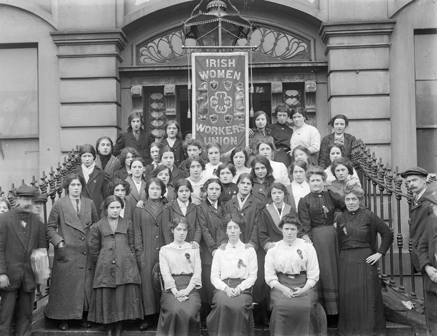
The early 20th century was a time of social change across Europe, particularly for women. In the U.K, Emmeline Pankhurst’s Women’s Social and Political Union, more commonly known as the ‘Suffragettes’, were making giant strides in the struggle for sexual equality.
In Dublin, working class women were, likewise, beginning to stand up for their rights.
In 1911, three thousand female workers at the Jacob’s biscuit factory downed tools, demanding better wages. According to the census of that year, the average male labourer’s wage was less than a pound a week, with women earning half as much.
The trade unions of the time forbade women from becoming members and so were of no help to the striking Jacob’s workers. This led to the formation of the Irish Women Worker’s Union, pictured left, founded by Delia Larkin, whose brother, Jim, became the organisation’s first president. The I.W.W.U had its headquarters at 18 Dame Street, holding nightly meetings between 7.30pm and 9.30pm.
The union would go on to play a vital role two years later, during the Lock-Out, providing food for striking workers and their families. Every member of the I.W.W.U was out of work for a full six months and this commitment to the cause was taking its toll, particularly on the children of striking workers.
The Catholic Church, vehemently opposed to the union movement, had blocked a scheme which would allow workers’ children to be looked after by British trade unionists during the protest, worried the children would fall under the influence of Protestants and Atheists.
Many I.W.W.U members were imprisoned during the Lockout, with some committed to institutions like Drumcondra’s High Park Convent, a Magdalen Industrial school run by nuns.
It’s her brother who history remembers more but, with her actions at the time, Delia Larkin was an important figure in both the Labour and Equality movements.
By Eric Hillis
Rosie Hackett
Rosie Hackett was born in Dublin in 1892 and worked as a messenger for Jacobs Biscuits. She became a member of the Irish Transport and General Workers Union and at the age of 18 was one of the first women in the company to join the men in solidarity in a strike in 1911. The strike was successful, leading to improvements in pay and conditions for women workers. Rosie, along with Delia Larkin, was a founder member of the Irish Women Workers Union in September 1911.
In August 1913, during the tram workers strike, Rosie joined the striking men once again in solidarity. She was on the streets during the infamous baton charge by the Dublin Metropolitan Police on what became known as ‘Bloody Sunday’. On the following Saturday, three Jacobs’s workers were sacked for refusing to remove their ITGWU badges and all of the workers were ultimately locked out by the employers.
In the hard times that followed, Rosie, along with the members of the IWWU, threw herself into working to help the strikers, in what became a battle for survival. She worked alongside Abbey actress and activist Helena Molony and Countess Markievicz in running soup kitchens in Liberty Hall during the dispute.
Rosie was never re-employed by Jacobs, most likely due to her trade union activity, and after the Lock-Out she worked full-time as a clerk for the IWWU.
She fought with the Irish Citizen Army during the 1916 Rising, and occupied the Royal College of Surgeons along with Countess Markievicz. In May 1917, a year after the execution of James Connolly, Rosie Hackett and a group of other young female trade unionists placed a banner across the front of Liberty Hall which read ‘James Connolly: Murdered, May 12th 1916’. Rosie later boasted that it took hundreds of policemen to drag those young women down from the building. She died in 1976, having spent 60 years in the trade union movement.
Rosie’s name is believed to be one of the favourites in the bid to find a name for the new Marlborough Street Bridge over the Liffey. A Facebook campaign is currently underway by the Irish Left Review to have the bridge named after her.
www.facebook.com/pages/Rosie-Hackett-Bridge-Campaign/109664749219687
By Ruth Kennedy

